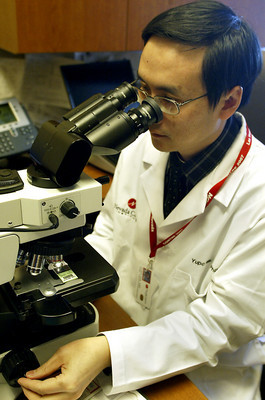Cancer expert goes to source
Dr. Yupo Ma knows it's not enough to just chop down a tree.
You've got to pull out its roots to fully finish the job, said the chief of hematopathology at the Nevada Cancer Institute.
This is sort of the approach Ma brings to his microscope every day while looking for sources behind leukemia.
"Just like trees, cancers come from a source, and if you take out that (leukemia) source, there's a chance you can eradicate it,'' said Ma, who recently received a $2 million grant from the National Institutes of Health to further his research into whether a particular gene found in a stem cell malignancy also leads to leukemia.
The gene he's focusing on is called SALL4. Already, in mice, Ma has found that it is present in myelodysplastic syndromes, or MDS, a group of diseases in which the bone marrow doesn't produce enough healthy blood cells. The gene is also found in acute myeloid leukemia in mice.
In humans, Ma is trying to determine the path of the SALL4 gene -- from where it originates to where it ends up, in patients with acute myeloid leukemia. By doing this, he hopes to be able to isolate the gene and target it with a specific treatment method.
Ma said roughly 30 to 40 percent of human myelodysplastic syndromes cases result in acute myeloid leukemia, a type of cancer that starts in the bone marrow. People with acute myeloid leukemia are more prone to infections and have an increased risk of bleeding.
"We're trying to see the whole spectrum of the evolution of the disease, from MDS to leukemia in humans,'' Ma said.
"There are a lot of options for treatment, but there's no cure,'' said Ma, who is also responsible for diagnosing leukemia and lymphomas at the Nevada Cancer Institute.
MDS has become more prevalent among elderly people and there is no known cure, health officials say. Roughly 14,000 new MDS cases are diagnosed each year in the United States, Ma said.
Ma said the country is in desperate need of a cure for leukemia.
His lab, staffed with several other researchers, has determined that SALL4 has the ability to cause a normal cell to become cancerous.
"Basically we're looking at something that is resistant to chemotherapy,'' he said.
SALL4 is known to exist on cancer stem cells.
"And we believe cancer stem cells are the root of cancers," Ma said. By targeting the stem cells and identifying their role in a cancer's progression, "then maybe a cure can be found,'' he said.
The NIH grant, which is for five years, is one of several Ma has received to support his research into SALL4 and its relationship to the development of leukemia. Ma's lab also received a three-year, $1 million grant from the Department of Veterans Affairs.
Contact reporter Annette Wells at awells@reviewjournal.com or (702) 383-0283.

















